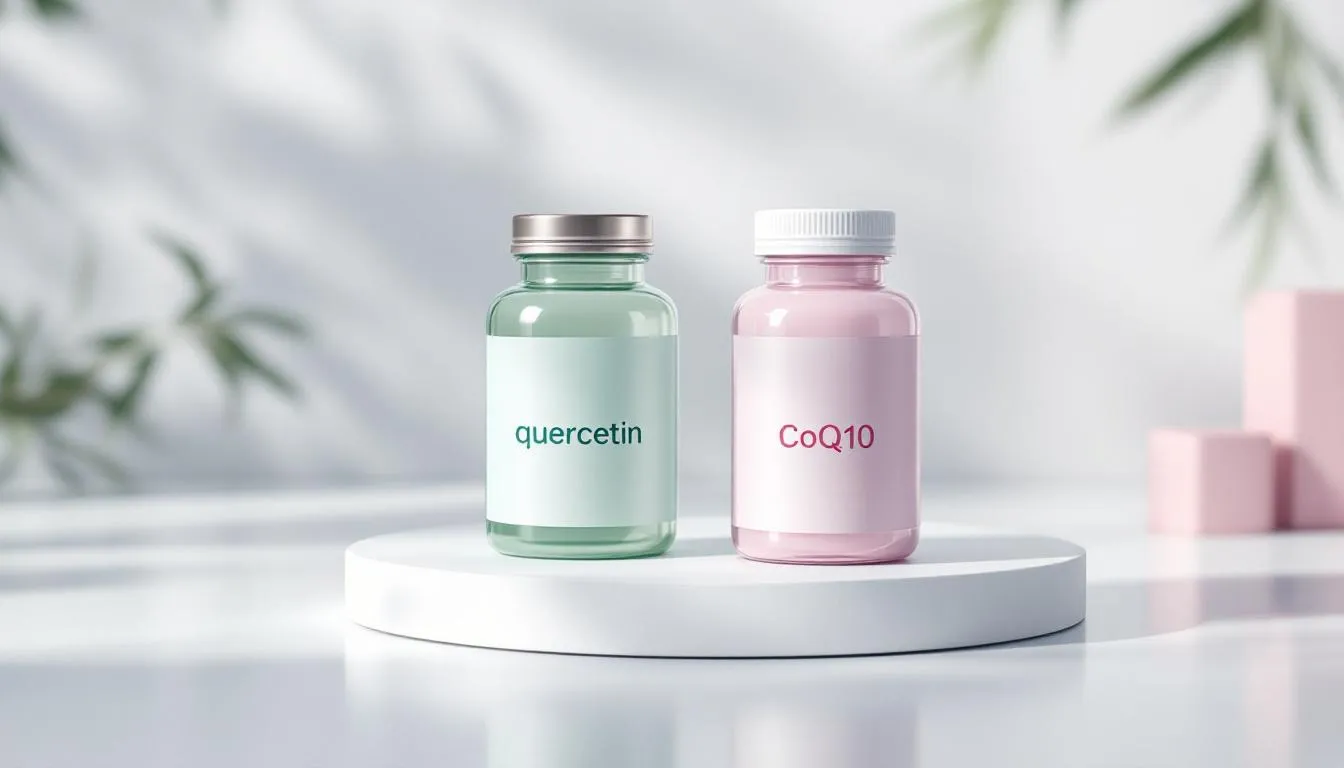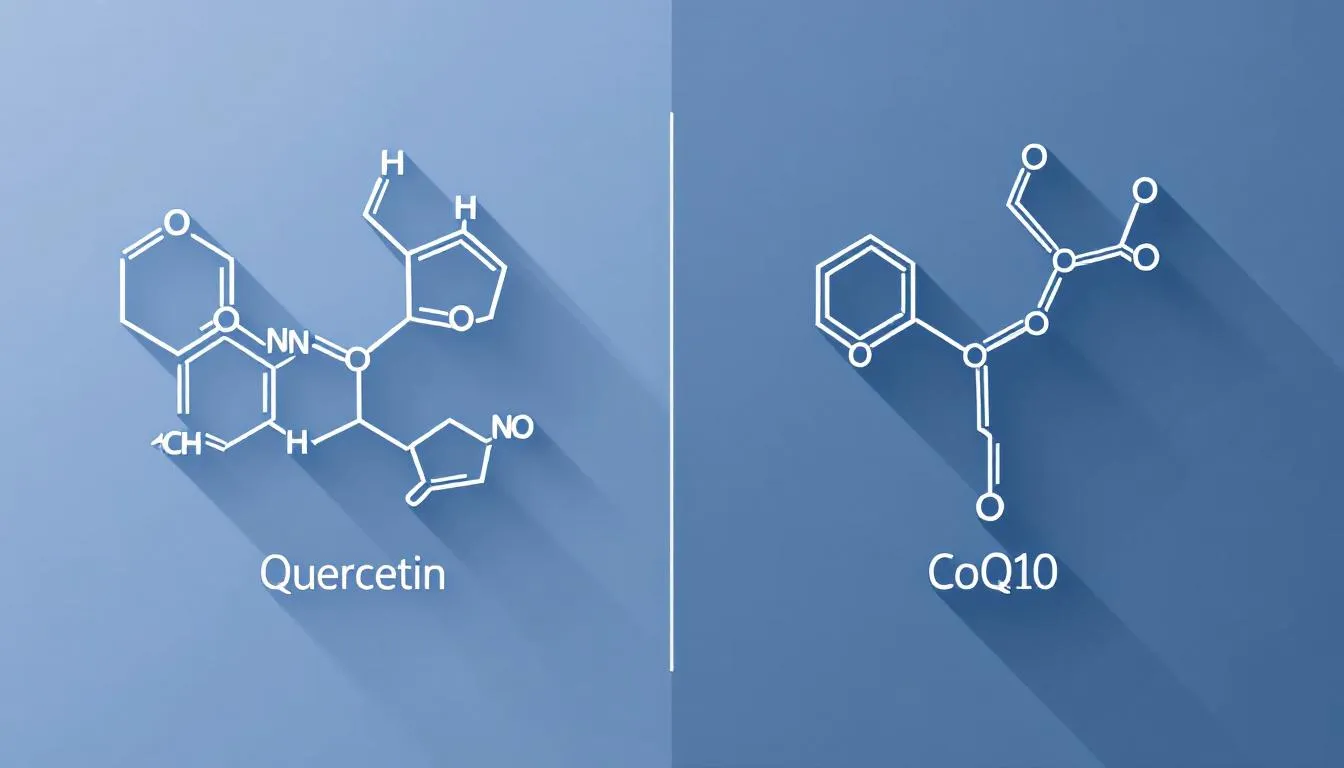Quercetin vs CoQ10: Benefits and Best Uses Explained

Deciding between Quercetin vs CoQ10 for your health? This article breaks down their benefits, uses, and differences to help you make an informed choice.
Key Takeaways
-
Quercetin is a plant-derived flavonoid with potent antioxidant and anti-inflammatory properties, supporting heart health and reducing inflammation.
-
CoQ10, a naturally occurring compound, is essential for ATP production and energy maintenance, also playing a significant role in managing inflammation and supporting metabolic health.
-
Combining Quercetin and CoQ10 can enhance overall health benefits, as their complementary actions improve cardiovascular wellness and reduce oxidative stress effectively.
Understanding Quercetin and CoQ10

Before discussing their benefits, it’s important to know what quercetin and coenzyme are. Quercetin is a plant-derived flavonoid known for its anti-inflammatory and antioxidant properties, making it a vital component in many health supplements. CoQ10, or coenzyme Q10, is naturally produced by the body and plays a key role in cellular energy production.
These two supplements, while distinct in their origins and primary functions, both contribute significantly to overall health. Quercetin is found in various plants, while CoQ10 is concentrated in energy-intensive organs like the heart muscle and liver.
What is Quercetin?
Quercetin is a flavonoid, a type of plant pigment that is found in many fruits, vegetables, and grains. Quercetin’s potent antioxidant properties help protect cells from oxidative damage, potentially preventing chronic diseases. This powerful antioxidant also possesses significant anti-inflammatory properties, making it a valuable supplement for those looking to support their immune system and reduce inflammation-related conditions.
In addition to its antioxidant activity, Quercetin is frequently used in dietary supplements aimed at improving heart health, reducing inflammation, and even as part of anti-aging treatments. Its versatility and natural origin make it a favorite for those pursuing a holistic approach to health and wellness.
What is CoQ10?
Coenzyme Q10, often abbreviated as coenzyme q10 Coq10, is a naturally occurring compound crucial for energy production in the body’s cells. It plays an essential role in the production of ATP (adenosine triphosphate), which is the primary energy carrier in all living organisms. CoQ10’s significance is particularly notable in energy-demanding organs such as the heart and liver, where it supports cellular energy production, enzyme activity, and overall function.
Levels of CoQ10 naturally decline with age, affecting energy levels and overall vitality. This decline highlights the importance of CoQ10 supplementation, particularly for older adults or those with certain health conditions.
Health Benefits of Quercetin
Quercetin supplementation offers a multitude of health benefits that make it a valuable addition to any wellness regimen. Its anti-inflammatory and antioxidant properties support cardiovascular health, reduce inflammation, and offer anti-aging effects.
Supporting Heart Health
One of the standout benefits of Quercetin is its ability to support heart health. It has been shown to help lower blood pressure and improve endothelial function, both of which are crucial for maintaining cardiovascular wellness. Research indicates that Quercetin can effectively reduce blood pressure, particularly in individuals with high blood pressure, thereby lowering the risk of heart disease.
Additionally, Quercetin helps in maintaining normal cholesterol levels, further contributing to cardiovascular health. By lowering blood pressure and cholesterol, Quercetin helps protect against cardiovascular diseases.
Reducing Inflammation
Quercetin is also known for its powerful anti-inflammatory properties. It can lower levels of inflammatory biomarkers such as C-reactive protein and IL-6, which are commonly elevated in various disease conditions. Reducing these inflammatory markers, Quercetin alleviates inflammation in cardiovascular diseases and other chronic conditions.
Quercetin’s inhibition of inflammatory markers like TNF-α and IL-6 effectively manages symptoms of conditions such as asthma and quercetin treatment for rheumatoid arthritis.
Anti-Aging Effects
Quercetin’s potent antioxidant properties are also beneficial for combating the effects of aging. Its ability to fight oxidative stress helps protect cells from damage, which is a key factor in the aging process. By neutralizing free radicals, Quercetin helps delay the onset of age-related conditions and maintains overall vitality.
Quercetin also supports cognitive health by reducing inflammation and oxidative stress in the brain. This neuroprotective effect helps prevent cognitive decline and neurodegenerative diseases, making it valuable for maintaining mental acuity with age.
Overall, Quercetin’s ability to reduce oxidative stress and support cognitive health makes it a powerful ally in the fight against aging. Its anti-aging, cardiovascular, and anti-inflammatory benefits make Quercetin a comprehensive supplement for overall health.
Health Benefits of CoQ10
CoQ10, or coenzyme Q10, is another supplement with many health benefits. While its primary role is enhancing energy production, CoQ10 also offers significant anti-inflammatory and metabolic health benefits.
Enhancing Energy Production
CoQ10 is essential for the production of ATP, the main energy currency of the body’s cells. By supporting the oxidative phosphorylation process, CoQ10 enables cells to produce energy efficiently, which is crucial for producing energy, maintaining high energy levels and reducing fatigue.
Supplementing with CoQ10 can also enhance exercise performance by improving mitochondrial function and reducing oxidative stress, which may help address mitochondrial dysfunction. This is particularly beneficial for athletes or individuals looking to improve their athletic performance, physical performance, and overall vitality.
Managing Inflammation
CoQ10 also plays a significant role in managing inflammation. It reduces inflammation by decreasing pro-inflammatory proteins and enhancing antioxidant defenses. This dual action makes CoQ10 effective for chronic inflammation conditions like cardiovascular diseases and diabetes.
Moreover, CoQ10’s ability to decrease oxidative stress further contributes to its anti-inflammatory effects, making it a valuable supplement for overall inflammatory management.
Supporting Metabolic Health
CoQ10’s role in supporting metabolic health includes:
-
Reducing oxidative stress, which protects cells from damage and supports overall metabolic function
-
Improving energy production within cells
-
Aiding in managing conditions like high cholesterol and glucose control, which are critical for metabolic syndrome health
Additionally, CoQ10 supports cardiovascular health by lowering high cholesterol levels, reducing the risk of cardiovascular diseases. Its impact on metabolic and cardiovascular health makes CoQ10 essential for overall vitality and health.
Comparing Quercetin and CoQ10

While both Quercetin and CoQ10 offer significant health benefits, they function through different mechanisms and can complement each other when taken together.
Comparing their antioxidant properties, cardiovascular impact, and roles in inflammation clarifies their individual and combined benefits.
Antioxidant Properties
Quercetin and CoQ10 both exhibit strong antioxidant properties, but their mechanisms differ when considering quercetin vs CoQ10. Quercetin, a pentahydroxyflavone, contains five hydroxyl groups that contribute to its antioxidant effect. This chemical structure allows it to combat oxidative stress effectively, protecting cells from damage.
In contrast, CoQ10 functions primarily within the electron transport chain, enhancing the body’s antioxidant defenses by supporting cellular energy production and reducing oxidative stress. Together, these mechanisms offer a comprehensive approach to antioxidant support, enhancing overall health.
Impact on Cardiovascular Health
Quercetin has been shown to lower blood pressure and improve vascular function, particularly in individuals with hypertension. Its capacity to lower blood pressure and improve endothelial function makes it valuable for cardiovascular health.
CoQ10 also supports cardiovascular health by improving heart function and reducing the risk of hospitalizations in patients with heart failure. Its role in energy production is crucial for maintaining heart muscle function, making it a complementary supplement to Quercetin for cardiovascular wellness.
Role in Inflammation
Both Quercetin and CoQ10 play critical roles in managing inflammation, though through different pathways. Quercetin directly inhibits inflammatory markers like TNF-α and IL-6. This action helps alleviate various inflammatory conditions.
CoQ10, on the other hand, reduces inflammation by addressing oxidative stress and enhancing antioxidant defenses. This complementary action makes both supplements effective in managing chronic inflammation, offering a synergistic approach.
Combining Quercetin and CoQ10
Combining Quercetin and CoQ10 can offer enhanced health benefits due to their complementary actions and distinct mechanisms. Combining Quercetin’s antioxidant and anti-inflammatory properties with CoQ10’s energy production can enhance overall vitality and health.
Enhanced Health Benefits
Combining Quercetin and CoQ10 can offer synergistic effects that enhance overall health. Quercetin supports cardiovascular health by lowering blood pressure, while CoQ10 enhances mitochondrial function, reducing fatigue and supporting metabolic health.
Together, these supplements address various conditions and enhance overall vitality. Their combined antioxidant properties reduce oxidative stress more effectively than either superoxide dismutase supplement alone.
Safety and Dosage Considerations
Considering safety and optimal dosages is important when combining Quercetin and CoQ10. The recommended dosage for Quercetin typically ranges between 500 mg to 1000 mg per day, while CoQ10 is often taken in dosages between 100 mg to 200 mg per day.
Both supplements are generally safe, but individuals should consult healthcare professionals before starting, especially those on anticoagulants, as they may increase bleeding risk.
Incorporating Supplements into Your Diet
Incorporating Quercetin and CoQ10 into your diet can be straightforward. Both supplements are generally recognized as safe, but mild digestive issues may occur in some individuals when taking these supplements.
Improving Bioavailability
To maximize the benefits of Quercetin and CoQ10, it’s important to address their poor bioavailability issues. Both supplements are known for their poor absorption, which can limit their beneficial effects.
Formulations designed to enhance bioavailability, like liposomal forms or combining nutritional supplements with other nutrients, can maximize their benefits.
Dietary Sources
Getting Quercetin and CoQ10 from dietary sources is a great way to boost your intake naturally. Quercetin is commonly found in a variety of foods, including fruits, vegetables, and beverages like red wine. Some of the richest sources of Quercetin include capers, which contain up to 365 mg per 100 grams, and red onions, providing about 39 mg per 100 grams.
For CoQ10, organ meats such as heart and liver are excellent primary dietary sources. Including these foods in your diet can significantly enhance your intake of this vital coenzyme, supporting energy production and overall health.
By incorporating foods rich in both Quercetin and CoQ10, you can enjoy their health benefits without solely relying on supplements.
Summary
Quercetin and CoQ10 are two powerful supplements that offer numerous health benefits through their distinct mechanisms. Quercetin excels in its antioxidant and anti-inflammatory properties, supporting heart health and providing anti-aging effects. On the other hand, CoQ10 primarily enhances energy production, manages inflammation, and supports metabolic health.
By understanding and incorporating these supplements into your daily routine, either through dietary sources or supplementation, you can harness their combined potential to improve overall vitality and well-being. Consider consulting with a healthcare professional to determine the best approach for your individual health needs.
Frequently Asked Questions
Can Quercetin and CoQ10 be taken together?
You can safely take Quercetin and CoQ10 together, as their distinct mechanisms may provide synergistic health benefits. This combination can enhance overall wellness.
What are the optimal dosages for Quercetin and CoQ10?
The optimal dosage for Quercetin is generally between 500 mg to 1000 mg per day, while CoQ10 is commonly taken at doses of 100 mg to 200 mg per day. Adhering to these guidelines may help maximize the benefits of these supplements.
Are there any side effects of taking Quercetin and CoQ10?
Quercetin and CoQ10 are generally considered safe, but they may cause mild digestive issues in some individuals. It is recommended to consult with a healthcare professional before beginning supplementation.
Can dietary sources provide enough Quercetin and CoQ10?
Dietary sources can indeed provide sufficient Quercetin and CoQ10; Quercetin is present in fruits and vegetables, and CoQ10 is found in organ meats. Incorporating these foods into your meals can effectively boost your intake of these nutrients.
How do Quercetin and CoQ10 support cardiovascular health?
Quercetin supports cardiovascular health by lowering blood pressure and maintaining normal cholesterol levels, whereas CoQ10 enhances heart function and reduces hospitalizations for heart failure. Together, they contribute significantly to overall heart health.
Researched and reviewed by Dr Elena Seranova, Ph.D. Dr Seranova holds a master's degree in Translational Neuroscience from the University of Sheffield, UK, and a Ph.D in Stem Cell Biology and Autophagy from the University of Birmingham, UK. She is a published author in multiple peer-reviewed journals, including Cell Reports and Developmental Cell.
LEARN MORE!






Leave a comment